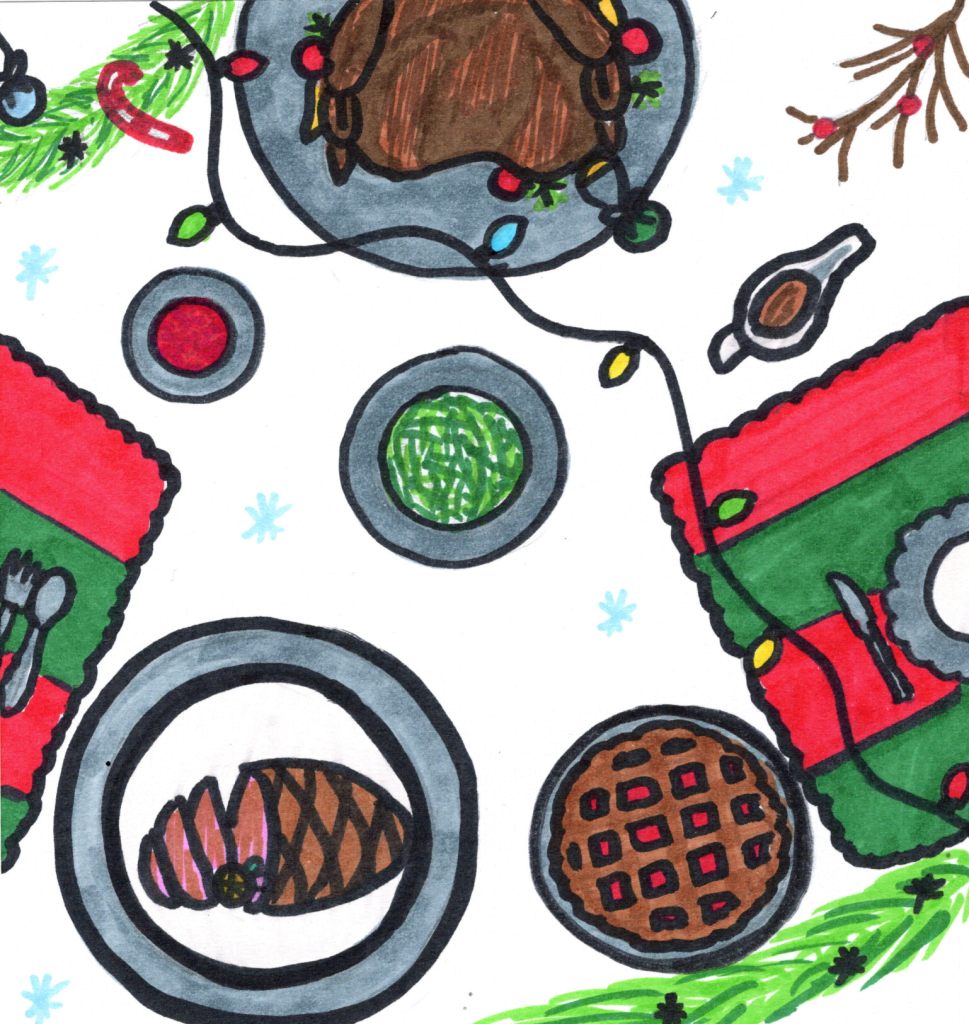 This information in this article is not intended to replace your normal supervised medical care regimen. Always consult your health care provider before making major changes in your diet, especially if you have an acute or chronic disease.
This information in this article is not intended to replace your normal supervised medical care regimen. Always consult your health care provider before making major changes in your diet, especially if you have an acute or chronic disease.
Are you worried about gaining weight over the holidays? Are you bombarded with online articles and TV talk show segments providing “healthy substitutes” for holiday dishes, as if it is wrong to enjoy a traditional holiday meal as-is, without shame? Some diseases such as diabetes, high blood pressure, and kidney disease may warrant slight or more pronounced deviations from the recipes of traditional holiday fare, but many of us can enjoy the same meals our grandparents and great grandparents enjoyed, freely. Even those with dietary restrictions can easily work within those restrictions under the guidance of their healthcare providers. Stress and worry about overeating are not necessary over the holidays. Let’s leave the stress behind and go into December and January with joy and merriment, with the assurance that it is great to eat, drink, and be merry.
I propose a two-step strategy to savor the great food of the holidays with little or no weight gain and a lot of fun.
STEP 1: ENJOY THE PARTY …. THEN LET IT GO
Enjoy the party, then go home with nothing edible. If the party is at your home, freeze leftovers for quick winter meals.
It is not easy to gain weight by eating one heavy meal, even if you overeat and must loosen your belt buckle or wear stretch pants for the remainder of the day. Theoretically, it takes 3500 extra Calories to gain one pound of body fat. Although it is possible to consume that many extra calories in a holiday meal, it is unlikely you will. Eating leftovers is most often what gets us in trouble, especially when we are nibbling on sugary desserts that do not satisfy, but, instead, leave us wanting more…and more. Adding extra calories via sweets and calorie-laden leftovers in the days and weeks between holiday meals can plump our bodies quite quickly. The easy way to keep that from happening is to leave the party without leftovers, or, if your home is the party zone, freeze leftovers to enjoy another day. Most Christmas cookies freeze well. And plates of frozen Christmas dinner could come in handy in February, after sledding or shoveling snow. Leftovers you do not freeze would surely be welcomed by guests with always-hungry teenagers or by neighbors who are not attending family gatherings this year.
The overall goal is to enjoy the holiday meals, but go back to regular eating patterns the next day.
STEP 2: ENJOY THE PARTY….IT IS GOOD FOR YOU
Mood plays a major role in our overall health. For example, regularly feeling stressed can have negative impact on blood pressure, pain, and immune system function. Feeling relaxed does the opposite, as does feeling joy. Going into the holiday season with a feeling of joyful anticipation (instead of worry of weight gain) can keep your appetite in check, especially if you tend to nibble when stressed. Remember, several holiday gatherings are unlikely to add over a pound or two to your weight, if that. It is the leftovers that can get you in trouble. So, if you are accomplishing Step 1, you’re well-prepared for Step 2.
The second part of Step 2 is to remind yourself of the awesome nutrients you are providing your body when you eat traditional Holiday Fare. Yes, many dishes have a lot of sugar, are high in calories, and some may have ingredients you probably should not eat often, but most traditional dishes also contain things that are great for overall health.
Below is a list of some popular holiday foods of the Shenandoah Valley and just a few of the healthy goodies they contain.
Turkey: Turkey should be a staple in our diets year-round, not just during special holidays. It is a great source of lean protein to maintain the body’s tissues right down to the bone! It is also rich in vitamins such as niacin and B-6 that help keep our nervous systems functioning well. It is a great source of zinc, a mineral important in keeping our immune systems in tip-top shape. Turkey also contains a protein component called tryptophan, which can promote a feeling of wellness and relaxation. No matter how you slice it, turkey is a healthy traditional holiday food.
Stuffing/Dressing: Yes, stuffing contains a lot of carbohydrates and fat, but it also contains turkey broth, which has healthy nutrients from the turkey, as well as foods like onions and garlic, which are packed with antioxidants and other chemical compounds that help keep the immune system robust and lower blood pressure.
Mashed Potatoes: White potatoes have developed a bad reputation, mainly because many of us eat more than we need, often via French fries. But potatoes are healthy, in moderation. They are a great source of potassium and other minerals and vitamins to keep the body going strong. Plus, they contain a carbohydrate called “resistant starch,” which is great for gut health. They also contain antioxidants, which help keep the body’s cells in good shape.
Sweet Potatoes: Sweet potatoes are another food that should be enjoyed the entire year, because they are packed with healthy things. Although I hesitate to call any food a “superfood,” sweet potatoes come close to earning that badge; I could write an entire article about their health benefits. They have many vitamins and minerals to help the body function optimally, and they contain carotenoids, which are pigments that work as antioxidants to keep the body’s cells safe, possibly lowering the risk of getting cancer. Sweet potatoes also contain a lot of beta-carotene, a compound found in red and orange vegetables that helps the eyes, heart, kidneys, and lungs stay healthy. An extra bonus for diabetics is that, although sweet potatoes contain a lot of carbohydrates, the carbohydrates are not broken down to sugar quickly, making sweet potatoes an excellent starchy vegetable for almost everyone, depending on how they are prepared.
Cranberry Sauce: If there are such things as “superfoods,” cranberries also wear the badge. Cranberries are packed with vitamin C, a vitamin and antioxidant vital for immune system health. In addition, cranberries contain other antioxidants that protect all the body’s cells. They also have other substances that have anti-inflammatory effects. Most people with chronic health conditions or eat a lot of sugar have low-grade systemic inflammation that may result in symptoms such as pain and fatigue; regular consumption of cranberries can help reduce the inflammation. They have also been shown to promote the growth of good bacteria in the gut and combat urinary tract infections.
Green Bean Casserole: Green beans are a staple for many rural Virginians, and that is a very good thing. They are loaded with a heart-healthy form of fiber and contain many cell-protecting antioxidants. They also contain various vitamins and minerals that help the body function well. As an extra bonus, green beans tend to be very gentle on the stomach, so if you are going into a holiday meal feeling a little queasy, go for an extra helping of green beans, knowing they won’t upset your stomach.
Cookies and Pies: Yes, cookies, pies, cakes, and other desserts contain way too much sugar and fat to eat regularly or in large amounts, but many also contain healthy ingredients like nuts, oats, and fruits. These items provide vitamins, minerals, fiber, and antioxidants. The healthy ingredients may not compensate for the excess sugar the desserts contain, but desserts are mainstays in holiday meals, so we are focusing on the positive. However, if you have diabetes or any disease that limits the sugar and other carbohydrates you can safely consume, please consult with your health care provider before indulging in anything with added sugar.
Fruitcakes: Well, fruitcakes really have nothing good to add to your body, but does anyone actually eat them? The healthy ingredients of fruitcakes may be the laughs we get from joking about them!
My wishes are for you to enjoy your holiday meals guilt-free and enter the New Year with a new perspective of healthy balanced healthy eating, which includes occasional indulgences. Please note, if you find you did not implement steps 1 and 2 well enough, and your pants button up too tight and stay that way, do not stress. Replace your jeans with stretchy pants temporarily and contact me or any other dietitian. Dietitians can help you get back into your jeans again before the winter is over.
Merry Christmas and Happy New Year.
Kay S Beatty, MS, RDN is a registered dietitian nutritionist and owner of Healthy Weight Options, LLC, www.HealthyWeightOptionsLLC.com. Contact her at Kay@HealthyWeightOptionsLLC.com or 540-560-9232. She is an in-network provider with Anthem Blue Cross/Blue Shield and Healthkeepers, Cigna, Aetna, Humana, United Healthcare, and VA CNN; patients with these insurances do not have any out-of-pocket expenses. She is also a Medicare provider.
































